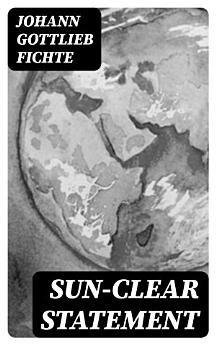Sun-Clear Statement
Johann Gottlieb Fichte
אוג׳ 2022 · DigiCat
ספר דיגיטלי
81
דפים
family_home
כשיר
info
reportהביקורות והדירוגים לא מאומתים מידע נוסף
מידע על הספר הדיגיטלי הזה
In 'Sun-Clear Statement,' Johann Gottlieb Fichte presents an erudite examination of transcendental idealism, an edifice upon which much of German philosophical thought of the time rested. The work is characterized by Fichte's precise and assertive prose which maneuvers through complex conceptual landscapes with the aim of delineating the scope and position of the newest philosophy within its rightful boundaries. By engaging directly with the reader, Fichte strives to clarify the most abstruse elements of his argumentation, insisting that his text serves as an elucidation rather than an expansion of philosophical doctrine. The literary style is rigorous and demanding, embedded within the philosophical discourse of the Enlightenment and early Romantic periods, making pronounced strides in the understanding of subjective consciousness and its role in the formation of knowledge. Johann Gottlieb Fichte, a formidable figure in German philosophy, informs 'Sun-Clear Statement' with his deep engagement in the intellectual discourse of his time. His commitment to the clarification and defense of transcendental idealism mirrors his broader philosophical ambitions to develop a system that fully accounts for the interrelations between the self and reality. Fichte's own scholarly journey, marked by studied interactions with the works of his contemporaries and predecessors, imbues this treatise with a sense of intellectual urgency, aiming to elucidate the true import of philosophy as an argumentative practice rather than a mere collection of philosophical concepts. For scholars and enthusiasts of philosophical literature, 'Sun-Clear Statement' is not only an essential reading but an intellectual challenge poised to refine one's conception of philosophy. Fichte's book comes highly recommended to anyone invested in the history of philosophical thought, particularly those keen on understanding the evolution of idealism and its impact on subsequent metaphysical and epistemological developments. The text is a testament to Fichte's enduring legacy as a thinker who, through the sheer force of his argumentation, seeks to bring the reader into a clearer understanding of philosophy's terrain within the human intellect and experience.
על המחבר
Johann Gottlieb Fichte was a seminal figure in German philosophy, born on May 19, 1762, in Rammenau, Saxony. A forefront intellectual during the late 18th and early 19th centuries, Fichte attended the University of Jena where his acquaintance with the works of Kant profoundly shaped his own thinking. He is often regarded as a key figure in German Idealism, expanding on Kant's critical philosophy to form his unique transcendental perspective. Fichte's philosophy emphasizes the active, spontaneous nature of the subject, often presented through a rigorous, almost axiomatic method, culminating in an ethical system where freedom is central. His philosophy laid the groundwork for later developments in existential and phenomenological thought, influencing philosophers such as Schelling and Hegel. His work 'Sun-Clear Statement,' though less well-known compared to his 'Science of Knowledge' (Wissenschaftslehre), continues to demonstrate his intricate analysis of knowledge and subjectivity. Fichte's literary style is characterized by a dense, challenging exposition, and by the attempt to synthetize a thorough account of consciousness and experience. His legacy extends beyond philosophy, as his ideas also resonated within the movement for German nationalism. Fichte's bold proclamation of the self-reliant 'I' and call for a moral populace made him one of the most provocative political thinkers of his time. He passed away on January 27, 1814, in Berlin, leaving behind a rich, complex body of work that continues to inspire philosophical debate.
רוצה לדרג את הספר הדיגיטלי הזה?
נשמח לשמוע מה דעתך.
איך קוראים את הספר
סמארטפונים וטאבלטים
כל מה שצריך לעשות הוא להתקין את האפליקציה של Google Play Books ל-Android או ל-iPad/iPhone. היא מסתנכרנת באופן אוטומטי עם החשבון שלך ומאפשרת לך לקרוא מכל מקום, גם ללא חיבור לאינטרנט.
מחשבים ניידים ושולחניים
ניתן להאזין לספרי אודיו שנרכשו ב-Google Play באמצעות דפדפן האינטרנט של המחשב.
eReaders ומכשירים אחרים
כדי לקרוא במכשירים עם תצוגת דיו אלקטרוני (e-ink) כמו הקוראים האלקטרוניים של Kobo, צריך להוריד קובץ ולהעביר אותו למכשיר. יש לפעול לפי ההוראות המפורטות במרכז העזרה כדי להעביר את הקבצים לקוראים אלקטרוניים נתמכים.







